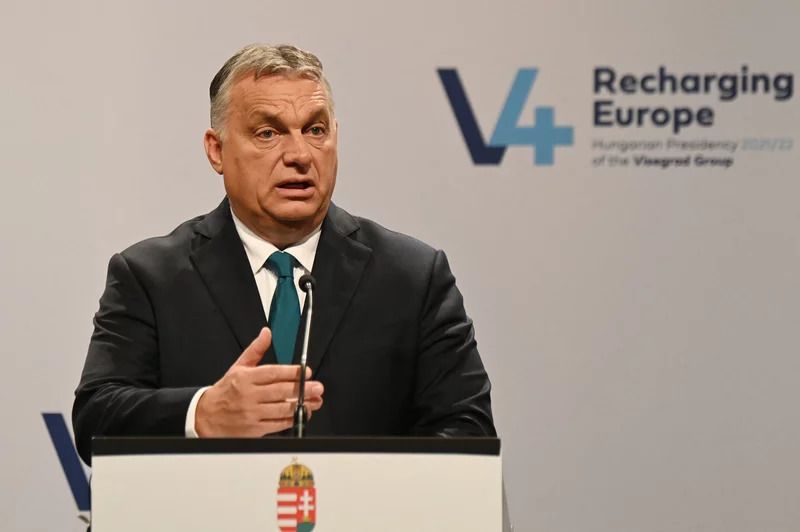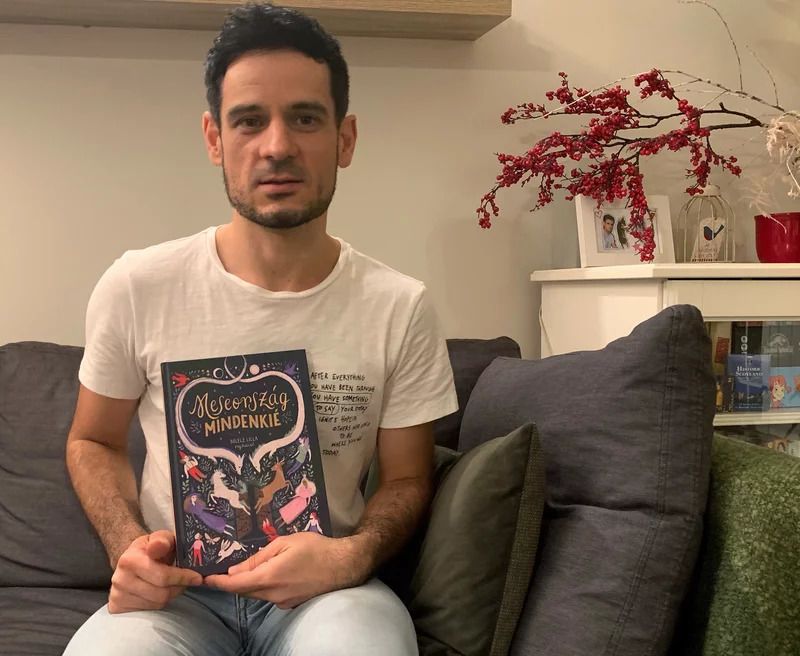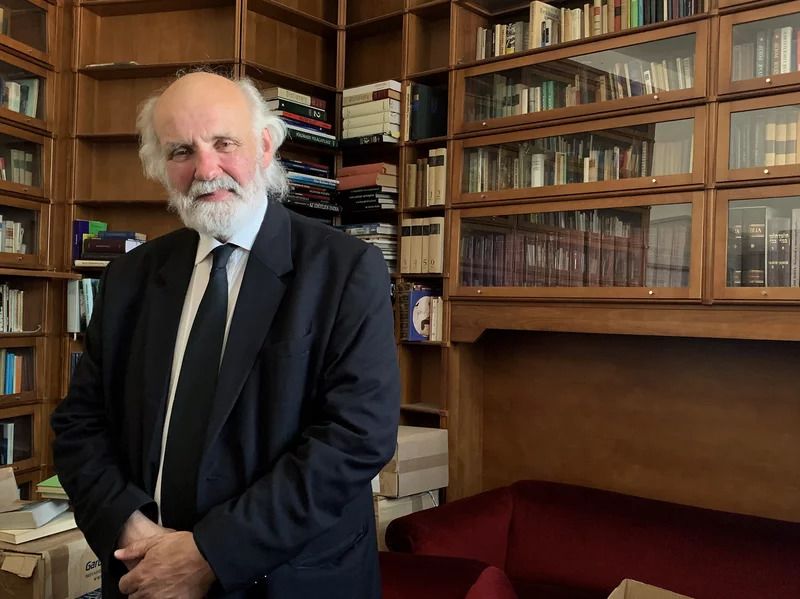
A discomfort with Western liberalism is growing in Eastern Europe
When President Biden greets scores of nations at his virtual "Summit for Democracy" this coming week, one member of the Western alliance won't be there.
Hungary, on the Eastern edge of the European Union, was not invited.
Washington and EU leaders in Brussels have repeatedly accused the country's ultranationalist government, led by Prime Minister Viktor Orbán, of undermining democracy. Biden once name-checked Hungary when referring to the "thugs of the world."
But Laszlo Magas, a retired professor who helped bring an end to communism in Hungary, chalks up his country's political isolation to one thing: Western liberal bias.
"Hungary is not the West's colony," says Magas, an Orbán supporter who echoes many of the prime minister's views. "The whole world is being misled about us. The mainstream media is full of fake news about us. The liberals want you to think Hungary doesn't know what democracy is because we don't share their beliefs."
Europe, he says, is ideologically divided between the conservative East and the more liberal West, something like red-and-blue America.
"And the border is the [former] Iron Curtain," Magas says. "We in the East are the ones protecting traditional European values, Christian values, while the West has gone crazy."
Many in Eastern Europe have concluded that Western liberalism is not a good fit
Orbán and his Fidesz party have become the flag-bearers of this mindset during their decade in power. The Hungarian government has repeatedly clashed with Brussels over migration, multiculturalism, press freedom and, most recently, LGBTQ rights.
Its target in this culture war has been liberal democracy, which Orbán has tried to equate with leftist and "unpatriotic" beliefs. Orbán is instead promoting "illiberal democracy," a term coined by journalist Fareed Zakaria to describe countries where elected leaders undermine checks on power.
Orbán first used the term in a 2014 speech promoting governance in the national interest, citing China, Russia and Turkey as examples. Four years later, after his party won in a landslide election, he declared that "we have replaced a shipwrecked liberal democracy with a 21st-century Christian democracy" that supports tradition and security.
"He's trying to position himself to play the role that [Cuban leader] Fidel Castro played for the left in the 1970s," says political scientist Ivan Krastev, who with Stephen Holmes, co-wrote The Light That Failed: Why the West Is Losing the Fight for Democracy, an examination of Eastern Europe's disillusionment with liberal democracy.
"The leftists fell in love with Castro for standing up for things they believed in, for being a revolutionary. Orbán and Hungary are playing the same role now, but for conservatives," Krastev says.
Hungary has become a magnet for European far-right nationalists and American conservatives. Fox News host Tucker Carlson took his show to Hungary for a week this August, treating Orbán to a glowing interview.
Former Vice President Mike Pence followed with September visit at which he said he hoped the U.S. would overturn abortion rights. Pence also praised the Hungarian government's promotion of "traditional family values" at the Budapest Demographics Summit, an annual paean to increasing population through more childbirth instead of immigration.
 Hungary's Prime Minister Viktor Orbán gives a press conference following
a meeting of prime ministers of central Europe's informal body of
cooperation, called the Visegrad Group (V4) in Budapest, Hungary, last
month.
Hungary's Prime Minister Viktor Orbán gives a press conference following
a meeting of prime ministers of central Europe's informal body of
cooperation, called the Visegrad Group (V4) in Budapest, Hungary, last
month.
And next year, the American Conservative Union is planning to hold a version of its Conservative Political Action Conference (CPAC) in Budapest.
The two groups — nationalists from behind the former Iron Curtain, and U.S. conservatives aligned with former President Donald Trump — exploit the same fear, Krastev says, "and this is the fear that there are not enough of us, that we're living in the world in which we are going to be replaced, in which our numbers are shrinking and in which we are going to lose our identity."
The end of communism meant political and cultural choices for the people of Eastern Europe
Laszlo Magas did not have those fears when he and other democracy activists pushed in 1989 to bring down the communist system and its strict limits on freedom of speech, assembly, religion and movement.
Magas, then a forestry engineering professor in the city of Sopron, helped organize a protest known as the Pan-European Picnic in a field near the border with Austria.
After thousands of young Hungarians and East Germans gathered there, Hungary's government opened the border, months before the fall of the Berlin Wall. It was the first breach of the Iron Curtain.
"We thought we could be free as part of a unified Europe if only we could open that border," Magas says.
But the initial elation of freedom gave way to culture shock, as Eastern European economies struggled and millions migrated west.
Laszlo Nagy, another organizer of the picnic protest, says communism put Soviet bloc societies into "the deep freezer" after World War II. "And when we emerged from this deep freezer in 1990, we went right into the microwave," he says. "The changes came too fast."
Krastev, who grew up in Bulgaria, another Iron Curtain country, says an existential crisis brewed in Eastern Europe.
"We wanted to be like the West, but the very moment you want to be like somebody else, it means that probably this somebody else is better than you," he says. "And then you start to have the fear of what about our own identity? What is going to happen?"
These questions have lingered in Hungary, a country of 10 million that has long seen itself as a small nation fighting to survive a long list of occupiers, including the Soviet-backed communists.
"During communism, Hungarian people were basically told by the Soviets how to live," says Natalia Borza, a philosopher and linguist in Budapest. "And OK, 30 years passed but still we have the memory of what it feels like being under someone else's rules."
Anti-communist Orbán is following his own path of illiberalism
Orbán has maintained his defiant message since he was a communist-fighting law student in the 1980s. In 2015, when more than a million asylum-seekers arrived in Europe, he presented them as invaders seeking to erase European demographics and culture. He rejected EU mandates to take in relocated refugees and to conform to Brussels' standards for rule of law.
More recently, at the demographics summit, Orbán accused the "Western left wing" of trying to "relativize the notion of family."
"Its tools for doing so are gender ideology and the LGBTQ lobby, which are attacking our children," he said.
Orbán's government recently passed a controversial law restricting the teaching of LGBTQ issues in schools. It was prompted by the publication in 2020 of Wonderland Is For Everyone, a children's storybook featuring gay, nonbinary and transgender characters.
Boldizsar Nagy, who edited the storybook, says he received death threats as the government attacked it.
"It became a tool for them, and they used it as the symbol of the 'Western enemy,' of Western decay," he says.
 Boldizsar Nagy is the editor of Wonderland Is for Everyone, a
children's storybook featuring gay, nonbinary and transgender
characters. The book's publication has led to an outcry on the right in
Hungary.
Boldizsar Nagy is the editor of Wonderland Is for Everyone, a
children's storybook featuring gay, nonbinary and transgender
characters. The book's publication has led to an outcry on the right in
Hungary.
The new law means books with LGBTQ themes are wrapped in plastic and forbidden to be sold within 650 feet of schools or churches. It also forbids high schools to invite educators like Eszter Ari, an evolutionary biologist and LGBTQ advocate, to speak about tolerance.
Ari says the government wants Hungary's LGBTQ citizens "to be quiet about who they are, or leave the country."
"The government has made us, their own citizens, the enemy," she says. "They want to divide the people so they are afraid and don't think about things like government corruption."
The law has angered Western European leaders like Mark Rutte, prime minister of the Netherlands, which, in 2001, became the first country in the world to approve same-sex marriage. Hungary "has no business being in the EU anymore," Rutte said this summer.
The European Union is threatening to cut funding to Hungary, which concerns even Hungarians who support Orbán's stand in the culture wars.
 Eszter Ari is an educator, evolutionary biologist and LGBTQ activist who advocates tolerance.
Eszter Ari is an educator, evolutionary biologist and LGBTQ activist who advocates tolerance.
The divisions in Hungarian society are growing, along with efforts to lessen them
Seventeen-year-old Annamaria Veszten considers herself a conservative and says she appreciates Orbán fighting for traditional values. But she's lived her whole life in a Hungary that's part of the European Union. "It's very good for our economy to be part of it," she says.
I met Veszten this summer in Esztergom, a city north of Budapest, that hosted a conference organized by Mathias Corvinus Collegium, a private educational institution that recently received more than $1.7 billion from Orbán's government. The conference headlined talks by American conservatives including Carlson, writer Rod Dreher and talk radio host Dennis Prager.
Veszten came away troubled that some attendees ridiculed and booed speakers with liberal views.
"It is not just Europe divided but also this country," she said. "I don't feel like we are part of one nation. It's more like two nations already."
Congregants at the Hungarian Evangelical Fellowship, a modest Methodist church on the outskirts of Budapest, feel the same way.
On a recent Sunday morning, a woman offers a prayer for Western-funded nonprofits that the government has labeled foreign agents. Another offers thanks for the church's tall, white-bearded pastor, Gabor Ivanyi.
"I know what it feels like to be cast out," Ivanyi says. "So I decided to become the kind of pastor who shows solidarity with those who are marginalized."
Like Orbán and Magas, who helped organize the 1989 protest to bring down the Iron Curtain, the clergyman fought the communist system. Hungary's Soviet-backed government evicted him from his church and boarded it up. For years, he was forced to preach on the streets.
 Pastor Gabor Ivanyi of the Hungarian Evangelical Fellowship, a modest
Methodist church on the outskirts of Budapest, worries about a growing
left-right divide in Hungarian society.
Pastor Gabor Ivanyi of the Hungarian Evangelical Fellowship, a modest
Methodist church on the outskirts of Budapest, worries about a growing
left-right divide in Hungarian society.
Ivanyi met Orbán while fighting communism, and at first, they were allies. He baptized two of Orbán's children and renewed the prime minister's wedding vows. But the pastor says he is angry that Orbán uses Christianity to vilify migrants and political critics.
"The protection of Christian values should not be handled by politicians," Ivanyi says, "because politicizing Christianity has steered European civilization to its utter demise twice."
There are signs that culture wars have limits. Orbán is wooing two Eastern powers — China and Russia — that both Hungarians and conservative culture warriors associate with communist suppression.
"Orbán sees relations with these countries as pragmatic, especially financially, and also as strategy in his fight with Brussels," says Andras Kosa, an Orbán biographer. "But Hungarians do not trust Moscow and Beijing and do not want to get too close to them."
Hungarians go to the polls next spring, and Orbán will face a newly united opposition. Its candidate is Péter Márki-Zay, a Christian conservative who is the mayor of Hodmezovasarhely, a small city in rural Hungary.
Márki-Zay is running on an anti-corruption platform and promises to defend Hungary's identity, but not at the expense of democratic institutions. He also says he will repair relations with the EU and Washington.
"I still stand for Western values," Márki-Zay told the AP last month. "We cannot accept a corrupt thug ... who betrays Western values and who is now a servant of Communist China and Russia."
A recent poll shows the opposition is giving Orbán's government a run for its money. But Orbán is sticking to his script. In a recent speech, he ridiculed the West as a place where "they can give birth as a man."
He also took a page out of Trump's playbook and suggested that Brussels and Washington are planning to meddle in the upcoming election.
"Even the entirety of the Left won't be able to stop us," he says.











